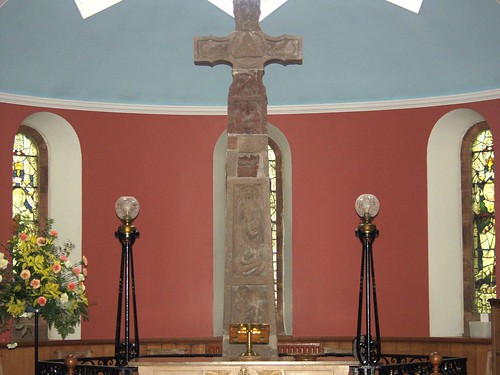When I was in graduate school, I spent an absurd amount of time researching and writing about one of the earliest Old English poems, "The Dream of the Rood." Two semesters' worth of research and writing, actually. I could have turned it into a thesis, as one of my professors kept suggesting. When I first started the project, I was supposed to do a lexical analysis of the piece for my History of the English Language class. I was trying to show that there were Celtic as well as Anglo-Saxon influences on the poem. So I got an Old English dictionary and eventually ended up doing my own translation of the whole 256 lines. Yes, you read that right - two HUNDRED and fifty-six.
The Ruthwell Cross,
on which part of "The Dream of the Rood" is inscribed in runes.
Dumfriesshire, Scotland. Photo by Peter Mattock
More recently, I've read a couple of books by Neil Douglas-Klotz, in which he translates various words of Jesus into the Aramaic that Jesus would have been speaking in when he lived, and from there into English. The result is quite poetic and illuminated. For instance, here's his translation of the Lord's Prayer:
O, Birther of the Cosmos, focus your light within us -- make it useful
Create your reign of unity now
Your one desire then acts with ours,
As in all light,
So in all forms,
Grant us what we need each day in bread and insight:
Loose the cords of mistakes binding us,
As we release the strands we hold of other's guilt.
Don't let surface things delude us,
But free us from what holds us back.
From you is born all ruling will,
The power and the life to do,
The song that beautifies all,
From age to age it renews.
I affirm this with my whole being.
Create your reign of unity now
Your one desire then acts with ours,
As in all light,
So in all forms,
Grant us what we need each day in bread and insight:
Loose the cords of mistakes binding us,
As we release the strands we hold of other's guilt.
Don't let surface things delude us,
But free us from what holds us back.
From you is born all ruling will,
The power and the life to do,
The song that beautifies all,
From age to age it renews.
I affirm this with my whole being.
When I first started studying the Bible with a Strong's Concordance handy, you can probably imagine how ecstatic I was. I would spend whole afternoons looking up every word in a single verse, and feel like I was digging up ancient treasure. Word archaeology.
I wrote two full pages in my notebook about the name "Jesus." I don't remember the whole rabbit trail now, but the general gist was that it means "open, wide, and free." At least that was what I took from it.
I began to see an analogy between words and computer icons. The way you can click on something and it opens up a whole new world that you couldn't have imagined when you were just looking at the icon.
Why is she going off about all this? you might well ask. Well, the other day, I was doing my evening prayer with the book a friend gave me for Christmas, Celtic Benedictions, by J. Philip Newell. This radiant little book of morning and evening prayer is decorated throughout with images from the 7th century Lindisfarne Gospels. Anyway, I looked up the verse featured that evening: "I commune with my heart in the night, I meditate and search my spirit" (Psalm 77:6).
In my New Revised Standard Version Bible there was a note about "I commune," an alternate translation of it, which I read as "My music spirit searches." I found this odd, but poetic and inspiring. It took me a minute to realize that because of how these notes are laid out on the page, I was actually reading it wrong. The alternate translation for "I commune" was simply "My music," and for "search my spirit," it was "my spirit searches." So the verse would then read, "My music is with my heart in the night; I meditate and my spirit searches." The New International Version actually translates this verse as "I remembered my songs in the night. My heart mused and my spirit inquired."
Maybe all of this doesn't excite you like it does me, but it's this kind of stuff that brings the Bible alive for me. For some, it's this very thing that confirms their rejection of the Bible as scripture, but for me, it emphasizes poetic truth as what's valuable over hard fact. There's grace and mystery in it, not fixed formulaic answers.
Much has been made of what gets lost in translation, but I'm here to say that a lot can be found. I research and explore this way because it's fun, and makes me feel like I'm peering into a divine kaleidoscope. My music spirit searches, and finds communion in and with the words.

